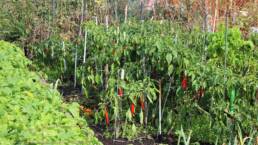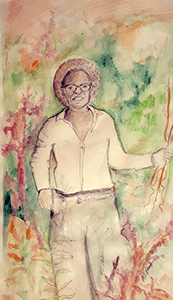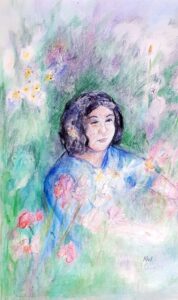
Stories from ‘The People’s Garden’
Creative in Residence, Angela Walcott, speaks to Judith Prince from the Ubuntu Collective and Yukie Hanada from HanaEarthGardens.ca.
October 24 2022 | By Angela Walcott

Meet Judith Prince, Director and Founder of Ubuntu Collective. Her mission is to create healing spaces that support well-being; restore balance and expand awareness. Her focus is on serving women and children of the African diaspora.
Of the many projects provided by the collective, the Grow Your Own Initiative explored the idea of urban gardening within the community. In 2020, Ubuntu Collective started a program that distributed over 100 seedlings to Black mothers encouraging them to grow their own food. This practice allowed participants to reconnect with the land and with nature. The collective continued this vision in 2021 with a 2,000-square-foot farm plot located in the Downsview Park area. The success of the program can be attributed to the dream of providing accessible, nutritious, high-quality food, year-round. From there, Ubuntu partnered with Adinkra Farm, a Black community organization, located North of Toronto. The outcome — a quarter acre of farmed land using organic regenerative no-till methods.
Despite many challenges associated with the COVID -19 pandemic fears and uncertainty surrounding restrictions and mandates did not impede their progress. The Grow Your Own Initiative persevered. Judith Prince, Founder and Director of Ubuntu Collective, rode the waves of doubt and found many rewards. Because plants were culled from their own food source, mothers found the activity to be both practical and restorative. “Parents found time to engage with their children and elderly parents in an activity that no one really made time for pre-pandemic,” Prince says. “There was a lot of wonder and excitement that went along with nurturing plants, sometimes for the first time.”
Perhaps the greatest lesson learned during the program was that the seeds we plant hold a far deeper meaning than we realize. “You need to tune in and be present to really find out what they are teaching us,” Prince observes. “Farming mirrors the life lessons we need to learn in our lifetime.”
Prince offers strategies and healing practices to combat issues that revolve around intergenerational trauma. This includes connecting with our ancestral knowledge in order to restore neglected farming practices, while creating new ways to thrive in a changing world. “Food is our medicine and sustenance,” Prince says and our cultures revolve around food.”

Yukie Hanada, a self-taught gardener has taken her passion for gardening to the next level. She shares her natural talent for gardening with others offering advice and tips about her experiences as a flower gardener. Her online business, HanaEarthGardens.ca which was created a little over a year ago, is where you will find over 20 varieties of carefully chosen seeds. The assortment includes new varieties, old classics, heirlooms, organic as well as Ontario native plants.
Selling seeds in small quantities makes prices more affordable and quantities manageable. ”My aim is to have you discover some new favourites, or to begin your gardening journey, without breaking the bank,” Hanada points out. Along with an impressive catalogue of flowers, she sells vegetables and fruit seeds as well.
After working in a flower shop in Japan, Yukie recalls first moving to Canada with no money to spend on flowers. Stuck in an apartment, she dreamt of having a backyard one day where she could grow her own flowers. Today, that dream is a reality. She has her own backyard where she plants, harvests and saves seeds. Hanada was recently featured in Chatelaine Magazine.
Much of what she has learned is self-taught, however, she admits that gardening includes a combination of both experiments and failures.The article goes on to point out that people like Yukie Hanada are part of a slow flower revolution that is growing within the flower industry. This movement is being led by small farmers, florists and seed sellers. Although she doesn’t do a lot of vegetable gardening, many of her friends and customers do.
She says it is important to embrace your fears and insecurities. “Just try it,” she says.
Her gardening interests blossomed during her childhood. Originally from Japan, she didn’t grow up amongst gardeners, being around nature left a lasting impression. But her true love for gardening grew after she started making her own garden.
After moving to Canada and purchasing a house she was able to create her own garden and she felt rooted. Gardening helped her to deal with anxiety and loneliness. Being in her garden was very soothing.
Apart from enjoying the beauty of flowers in bloom, growing from seed is something she looks forward to seeing. “To witness the wonder of plants — a little tiny seed becomes a big flower or fruit or a tree is just incredible and knowing you started the whole process is very satisfying and of course, so fun,” Hanada says.
Yukie Hanada manually cleans the seeds, processes and harvests from her own garden. “It’s very time-consuming but I love the whole process,” she says. “It’s very therapeutic for me.”
She believes that interest in gardening has grown. “Now we need to teach people to garden organically and in sustainable ways like using no chemicals. As climate change has added a list of challenges to gardening, Hanada is thinking about how this will affect her practice. “Promoting composting or using the leaves as mulch; using rainwater or having a rain garden. We have more hot summer days or really unpredictable weather … I’m trying to be as sustainable as possible. So I’m thinking of shifting to grow more drought-tolerant and hardy plants.”
While she wants to promote growing more native plants, what, might you ask, is on her wish-list of plants to grow? Rattlesnake Master and Culver’s Root, of course.
Ontario Culture Days runs an annual Creatives in Residence program. Part of the work of the Creatives is presented during public events for our festival of free arts and culture programming across Ontario.
Meet this year’s cohort and learn more about ‘The People’s Garden,’ by Angela Walcott.
